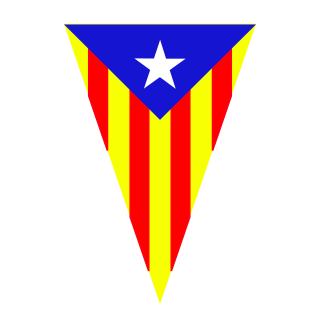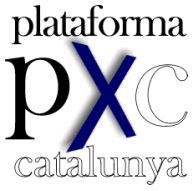The Republican Left of Catalonia is a pro-Catalan independence, social democratic political party in the Spanish autonomous community of Catalonia, with a presence also in Valencia, the Balearic Islands and the French department of Pyrénées-Orientales. It is also the main sponsor of the independence movement from France and Spain in the territories known as Catalan Countries, focusing in recent years on the creation of a Catalan Republic in Catalonia proper. Its current president is Oriol Junqueras and its secretary-general is Marta Rovira. The party is a member of the European Free Alliance.

The Democratic Convergence of Catalonia, frequently shortened as Convergence was a Catalan nationalist, liberal political party in Catalonia (Spain), currently still existing without any political activity.
Initiative for Catalonia Greens was an eco-socialist political party in Catalonia. It was formed as a merger of Iniciativa per Catalunya and Els Verds. IC had been an alliance led by Partit Socialista Unificat de Catalunya and was the equivalent of Izquierda Unida in Catalonia. IC later developed into a political party, and PSUC was dissolved. The youth of ICV was called Joves d'Esquerra Verda. It used to be called JambI, Joves amb Iniciativa.

Estat Català is a pro-independence nationalist historical political party of Catalonia (Spain).

The Popular Unity Candidacy is a left-wing to far-left pro-Catalan independence political party active primarily in Catalonia, where it has political representation, but also in other autonomous communities in Spain it considers to be part of the Catalan Countries. The CUP traditionally has focused on municipal politics, and is made up of a series of autonomous candidatures that run in local elections. Its presence is strongest within the borders of Catalonia.

Platform for Catalonia was a far-right political party rooted in Catalonia, Spain, which centred its political agenda around controlling immigration and was opposed to Catalan independence. It was strongly anti-Islamic and was widely considered a racist, xenophobic political force. Its leader was Josep Anglada, town councillor in Vic.

Unity for Socialism was an electoral coalition in Catalonia, Spain, contesting the 1980 Catalan parliament election. The coalition represented the main groups of the non-parliamentary left in Catalonia at the time. It was constituted by the Workers Party of Catalonia (PTC), Communist Organization of Spain, Revolutionary Communist League (LCR) and the Communist Movement of Catalonia (MCC). Manuel Gracia Luño was the top candidate in the Barcelona constituency, whilst Jordi Creixans headed the Girona list, Francisco Javier Clavería (PTC) headed the Lleida list and José Semente Moya (MCC) was the top candidate in Tarragona.

Democrats of Catalonia is a Christian-democratic, pro-Catalan independence political party in Catalonia founded in July 2015 from a split in Democratic Union of Catalonia (UDC). Its members included the then-Speaker of the Catalan parliament Núria de Gispert and former UDC president Joan Rigol. The party has received accusations of xenophobia for its controversial statements against Spaniards, and for having ties with xenophobic organizations.
The Democratic Pact for Catalonia was a Catalan electoral alliance established in May 1977 ahead of the Spanish Congress of Deputies 15 June election. It ran on a political platform emphasizing the need of approving a statute of autonomy for Catalonia. The coalition comprised members from two separate, previously established alliances: Democratic Convergence of Catalonia (CDC) and Democratic Left of Catalonia (EDC) from the Democratic Front for Catalonia, and the Socialist Party of Catalonia–Regrouping (PSC–R) and the National Front of Catalonia (FNC) from the Left Front.

Democratic Left of Catalonia was a political party in Catalonia (Spain). EDC was founded in 1975 as the Catalan Liberal Party, and ideologically it defined itself as "radical liberal" and federalist. It was merged into Democratic Convergence of Catalonia (CDC) on 27 June 1978.
Left Bloc for National Liberation was a coalition and, later, political party in Catalonia and Valencia, Spain. BEAN was an independentist and socialist party, that defended a Socialist Federal Republic of the Catalan Countries.
The Catalan European Democratic Party, initially branded as the Catalan Democratic Party, was a liberal political party in Spain that supported Catalan independence. The party was founded in Barcelona on 10 July 2016 and dissolved on 28 October 2023. PDeCAT was regarded as the successor party to Democratic Convergence of Catalonia (CDC), which for most its history was a constituent party of the Convergence and Union (CiU) political formation.

Union of the Centre and Christian Democracy of Catalonia was an electoral coalition formed in Catalonia in December 1976 to contest the Spanish Congress of Deputies election of 1977, the first democratic election to be held in Spain since the Second Spanish Republic. It was formed by the Catalan Centre (CC) and the historic Democratic Union of Catalonia (UDC), and came to be supported by the Christian Democratic Team of the Spanish State, which did not run on its own in Catalonia. The coalition was officially registered on 3 May 1977. The alliance dissolved shortly after the election upon the start of the newly elected parliament, with UDC deputy Antón Cañellas joining the Catalan–Basque Group and Carlos Güell going into the Mixed Group.
The Greens–Green Alternative is a political party based in Catalonia, founded in September 1999 by former members of The Greens–Ecologist Confederation of Catalonia (EV–CEC), after the party had split in March 1998 over the type of relationship to establish with the newly-autonomous Initiative for Catalonia (IC).

Union of the Centre of Catalonia was a political party based in Catalonia, created in March 1978 as a result of the merger of Catalan Centre, League of Catalonia–Catalan Liberal Party, Union of the Christian Democrats of Catalonia–Jacques Maritain Club, most of the Social Democratic Party of Catalonia and Party of the Catalan People. The party was led by Carles Güell as president and Joaquim Molins as secretary-general.

Together for Catalonia was an electoral and parliamentary alliance in Catalonia, registered as a political party in the interior ministry in July 2018, originally envisaged as a platform comprising the Catalan European Democratic Party (PDeCAT), successor of the late Democratic Convergence of Catalonia (CDC), and independents and centered around the candidacy of former Catalan president Carles Puigdemont ahead of the 2017 Catalan regional election. Some of these independents went on to form the Action for the Republic (AxR) political party, which is also part of the alliance in the Parliament of Catalonia.

Som Catalans is a xenophobic and independentist party, active in the Spanish autonomous community of Catalonia and founded in 2014 by Ester Gallego and Enric Ravello, following a scission from Platform for Catalonia.
The Nationalist Party of Catalonia is a Catalan nationalist and liberal political party in Catalonia. The party was established on 12 May 2020 by former Catalan European Democratic Party (PDeCAT) coordinator-general Marta Pascal. It held its founding congress on 27 June 2020, under a political manifesto in which they announce their commitment to an agreed referendum as the solution for the issue of Catalan independence.

The Social Democratic Party of Catalonia was a political party in Catalonia, led by Jaume Casanovas and defining itself as left liberal, that split from Democratic Left of Catalonia (EDC) in April 1976 over leadership rather than ideological disagreements. The party would join the Spanish Social Democratic Federation of Francisco Fernández Ordóñez and José Ramón Lasuén.

Together for Catalonia, frequently shortened to Junts, is a Catalan nationalist and pro-independence political party that sits on the centre-right of the political spectrum. It is the second-largest party in the Parliament of Catalonia, holding 35 of the 135 seats. The current party president since 2024 is Carles Puigdemont.















